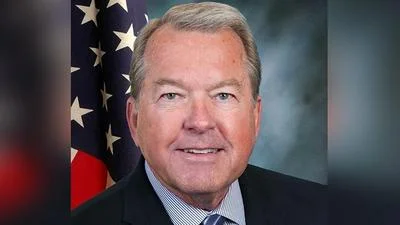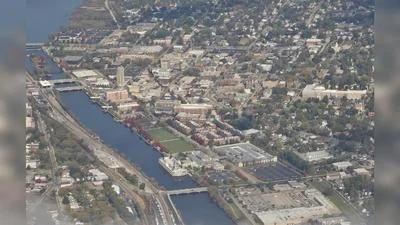The result of this year’s November election was arguably the most surprising event of 2016.
Aside from President-elect Donald Trump's winning the election after a brutal campaign season, many were shocked that former U.S. Secretary of State Hillary Clinton lost key states including Wisconsin, Michigan and Pennsylvania.
Patrick Hughes, co-founder at the Illinois Opportunity Project, said Clinton’s loss indicates that the Republican Party is gaining ground across the country.
“You look around us, you see the blue wall crumbling,” Hughes said during a recent episode of “Illinois Rising,” a radio show hosted by Dan Proft. “Hillary Clinton didn’t even campaign in Wisconsin. She thought it was in the bag and it came tumbling down and went for Trump.”
Trump may have won over voters in some states that are traditionally blue states, but Illinois was not one of them. With Cook and six other counties holding 65 percent of the state’s population, Chicagoland voters dwarf any attempt by downstate voters to turn the state red.
“There’s something going on in that corridor that’s different, than say, in the suburbs of Milwaukee, Wisconsin or in the suburbs of Pittsburgh, Pennsylvania or even Philadelphia, where Trump got hammered,” Hughes said.
Clinton had the advantage in Chicago going into the election because she is a native of the city, but Republicans need to take a deeper look at why Trump didn’t do well in Chicago suburbs, Hughes added.
“There’s something going on here, and it’s different from the rest of the country,” he said. “And if Republicans want to take back the [state] House -- and we picked up seats in the House and we picked up seats in the Senate -- but if we want to take control of the House, which is ultimately the goal … to get (Illinois House Speaker Michel Madigan (D-Chicago)) out of there, that riddle has got to be solved.”
Without solving the “riddle” and finding out why those areas continue to vote for Democrats despite them destroying the state’s economy, Hughes thinks Chicagoland will continue to “kill” the Republican vote in downstate Illinois.
“That question has to be answered, and I think the traditional excuses that Republicans have used in the past don’t apply,” he said. “One of the things we used to say all the time was, ‘We are out-resourced. Madigan out-spends us 4 to 1, or whatever. We had resource parity at a minimum this year with [GOP Gov. Bruce] Rauner and without side groups…so that’s not the reason. There’s a messaging issue there.”
Republicans have no time to spare with the 2018 state elections on the horizon. But perhaps a Trump presidency and the new Congress may help boost Republican support in Illinois and prove to be beneficial.
In a column for the Chicago Tribune, Diana Rickert, vice president of communications at the Illinois Policy Institute, said one of the ways the incoming Congress can help Illinois is by turning federal dollars for education into scholarships for children.
“Six years ago, Illinois considered allowing state money for education to follow students to any school they choose, private or public,” she said. “Parents whose children were assigned to the lowest-performing public schools in Chicago would have been given the opportunity to use that money to send their children elsewhere. But the measure failed, and the effort has not been revived.”
What has happened instead is that educational options have narrowed in the state. An example of this focuses on the Chicago Teachers Union’s latest contract, which bans the city from increasing the number of its charter schools, Rickert said.
She continued by adding that converting federal dollars to scholarships could mean Chicago Public Schools students would receive approximately $2,200 each, while the typical student elsewhere in Illinois receives $1,100.
“It's not a lot of money, and of course a state voucher program would yield thousands more dollars per student — perhaps enough to cover the tuition at many nonpublic schools,” Rickert said. “But we don't have time to wait for the Illinois legislature; kids need that money now, and federal dollars offer a good starting point.”
The second thing Congress could do is amend federal bankruptcy law so that states with massive public pension debt, like Illinois, can file for bankruptcy and recognize taxpayers as a “party of interest,” according to Rickert.
“Every family in Illinois is on the hook for tens of thousands of dollars in pension costs that we didn't have a say in, and which far surpass what we in the private sector will ever have access to,” she said. “It's also hard to stomach that the state keeps promising new pension benefits to teachers, state employees and other government workers when we know full well we can't afford to pay for them.”
This does not, however, automatically mean that bankruptcy is the right vehicle to get Illinois’ finances back on track, but Rickert believes it's better than doing nothing about the problem.
“Perhaps the option of bankruptcy will spur opponents of reform to agree to a solution outside of bankruptcy court,” she said. “If not, then bankruptcy can help Illinois get a handle on its finances the way the same way it helped American Airlines, major cities across the country and millions of Americans.”
Finally, appointing a U.S. Supreme Court justice who will end forced unionization in government jobs would alter the way unions operate in Illinois, according to Rickert.
Most states give government workers the freedom to choose whether they would like to become members of a union and pay membership fees toward the union, she explained. Illinois, however, does not provide that choice and forces state workers to join their workplace union -- even if they are unhappy with the union and do not condone its actions.
“Many speculate that public-sector 'right to work' would have become law of the land were it not for the untimely death of Justice Antonin Scalia in February of [last] year,” Rickert said. “Trump should appoint, and the U.S. Senate should approve, a U.S. Supreme Court justice who will rule in favor of public-sector right-to-work laws. State workers in Illinois deserve the same workplace rights as their counterparts in Michigan, Indiana and Wisconsin.”






 Alerts Sign-up
Alerts Sign-up